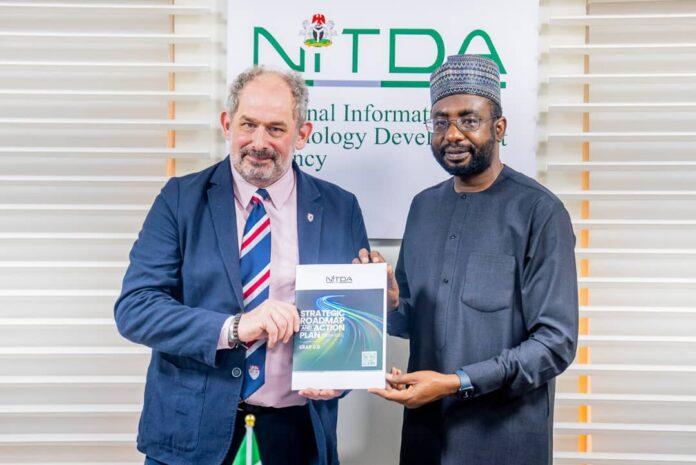by Joy Onuorah
Nigeria’s digital transformation just got a major boost and research is at the heart of it.
In a recent meeting at the National Information Technology Development Agency (NITDA) headquarters in Abuja, Director General Kashifu Inuwa, CCIE, made a strong case for strategic collaboration between academia, government, and industry to fuel national growth and empower the youth.
The high-level visit, led by Professor Kirk Semple, Director of International Research at Lancaster University, UK, focused on the Research and Innovation Partnership for Entrepreneurship (RIPE), a bold initiative using academic research to drive entrepreneurship and economic impact.
Why Research Matters Now More Than Ever
“Nigeria and Africa at large don’t invest in research,” Inuwa stated. “For us to build a robust and sustainable economy, we need to invest in research.”
Using agriculture as an example, he explained how Nigerian farmers lack access to real-time data and digital tools that could improve productivity.
According to him, research and development (R&D) is the missing link needed to fix this and other industry challenges.
Emerging Tech, Real-World Problems
Inuwa outlined NITDA’s focus on frontier technologies like AI, IoT, drones, blockchain, robotics, and 3D printing, noting their vast potential for solving local problems and opening up economic opportunities.
“The goal is to create a vibrant technology-research ecosystem that unites academia, industry, government, entrepreneurs, and risk capital,” he said.
But to get there, Inuwa stressed the importance of revising university curricula to meet industry needs, urging stakeholders to reduce fragmented efforts and work in synergy.

Tying It All to National Development
In line with the Federal Government’s eight-point agenda—covering everything from security and agriculture to education and innovation—NITDA is rolling out a clear strategy.
This includes their Strategic Roadmap and Action Plan (SRAP 2024–2027), built on eight key pillars:
Digital Literacy & Talent Development Technology Research Ecosystem
Stronger Policy & Legal Framework
Inclusive Digital Access
Cybersecurity & Digital Trust
Innovation & Entrepreneurship
Strategic Partnerships
Agile Workforce & Organisational Culture
“We place a strong emphasis on research because without it, you can’t develop effective policies or regulations that drive real change in the ecosystem,” Inuwa added.
The Global Connection
Professor Semple highlighted Lancaster University’s global research mission, positioning the RIPE program as a bridge between theory and practice.
“Universities today are under pressure to demonstrate value beyond knowledge creation. Strategic partnerships like this with NITDA help ensure research-informed policy, support innovation, and drive meaningful change in communities,” he said.
He also stressed the need for long-term, diverse networks that break silos and tackle global issues like climate change and tech inequality through shared expertise and collaboration.





